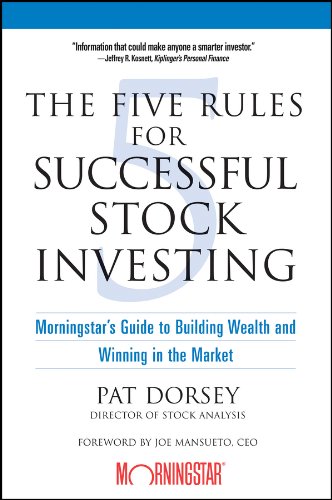Overview : The Five Rules for Successful Stock Investing
-
Book Title: The Five Rules for Successful Stock Investing
-
Author: Pat Dorsey
-
Publication Date: November 2003
-
Rating: 4.5
-
price: $14.79
-
Pages: 384
About the Author
"The Five Rules for Successful Stock Investing" is authored by Pat Dorsey, a renowned investment expert and former Director of Equity Research at Morningstar. In this insightful book, Dorsey breaks down essential strategies for stock investing, guiding readers on how to evaluate companies effectively, avoid common investment pitfalls, and make informed decisions based on long-term value.
The Five Rules for Successful Stock Investing Introduction
In the dynamic world of finance and investing, finding a reliable guide to navigate the complexities of the stock market is crucial. Pat Dorsey's "The Five Rules for Successful Stock Investing" emerges as a beacon for both novice and experienced investors. This comprehensive review explores how Dorsey's expertise translates into actionable insights for those looking to master the art of stock investing.
The Five Rules for Successful Stock Investing Book Summary
Pat Dorsey, former Director of Equity Research at Morningstar, distills years of market wisdom into five fundamental rules:
- Do Your Homework
- Find Economic Moats
- Have a Margin of Safety
- Hold for the Long Term
- Know When to Sell
These principles form the backbone of a robust investment strategy, applicable across various market conditions and personal finance scenarios.
Analysis of Themes
1. Thorough Research
Dorsey emphasizes the importance of due diligence in stock selection. He provides readers with tools to analyze financial statements and assess a company's market position, essential skills in today's information-rich investing landscape.
2. Economic Moats
The concept of economic moats is central to Dorsey's investment philosophy. By identifying companies with sustainable competitive advantages, investors can position themselves for long-term success. This approach aligns with current market trends that favor companies with strong brand loyalty and network effects.
3. Value-Based Investing
Dorsey advocates for a margin of safety in stock purchases, echoing the teachings of value investing pioneers. This conservative approach serves as a bulwark against market volatility, a particularly relevant strategy in today's unpredictable economic climate.
4. Long-Term Perspective
In an era of day trading and algorithmic strategies, Dorsey's emphasis on long-term holding stands out. This principle resonates with the growing interest in sustainable investing and the power of compound growth in personal finance.
5. Strategic Selling
Knowing when to exit a position is as crucial as knowing when to enter. Dorsey's insights on selling strategies help investors maintain objectivity in their decision-making process, a vital skill in managing a diverse investment portfolio.
Writing Style
Dorsey's writing is clear and accessible, making complex financial concepts digestible for a broad audience. While the tone remains professional throughout, the author's passion for investing shines through, engaging readers with real-world examples and case studies.
The Five Rules for Successful Stock Investing Strengths and Weaknesses
Strengths:
- Comprehensive coverage of fundamental analysis
- Practical tools and checklists for immediate application
- Balanced approach to qualitative and quantitative analysis
Weaknesses:
- Limited discussion of modern trading technologies
- Some examples may feel dated to contemporary readers
- Assumes basic financial literacy, which may challenge absolute beginners
The Five Rules for Successful Stock Investing Alternatives
While "The Intelligent Investor" by Benjamin Graham is often considered the bible of value investing, Dorsey's work provides a more accessible entry point for modern investors. Compared to more technical texts like Aswath Damodaran's "Investment Valuation," Dorsey strikes a balance between depth and readability.
"The stock market is a device for transferring money from the impatient to the patient." - Warren Buffett
This quote, often attributed to Warren Buffett, encapsulates the long-term perspective that Dorsey advocates throughout his book.
Highlights from The Five Rules for Successful Stock Investing
Understand the Business: Invest in companies you thoroughly understand, including their operations, products, and industry.
Focus on Fundamentals: Prioritize financial health, profitability, and sustainable growth over short-term market trends.
Valuation Matters: Avoid overpaying for stocks; seek companies trading below their intrinsic value.
Long-Term Perspective: Invest with a long-term mindset, avoiding emotional reactions to market fluctuations.
Diversify Wisely: Spread investments across industries and asset classes to minimize risk.
Avoid Speculation: Base decisions on sound research and analysis, not market hype or predictions.
Continuous Learning: Stay informed and adapt your strategies as market conditions change.
Conclusion
In an investing landscape increasingly dominated by short-term thinking and complex financial instruments, Dorsey's "Five Rules" serves as a grounding force. The book's principles are as relevant today as they were when first published, offering a framework for navigating everything from traditional stocks to emerging asset classes like cryptocurrencies. For investors looking to build a solid foundation in stock analysis and portfolio management, this book is an invaluable resource. Its teachings on identifying quality businesses and maintaining a disciplined approach resonate with current trends in sustainable investing and long-term wealth creation.
Ready to elevate your investing game? Purchase "The Five Rules for Successful Stock Investing" on Amazon and start your journey towards financial mastery today. Your investment in knowledge today could lead to substantial returns tomorrow. This review is based on the latest edition of the book and reflects market conditions as of [current year]. Always consult with a financial advisor before making investment decisions. In conclusion, this article has provided an overview of the topic at hand.





